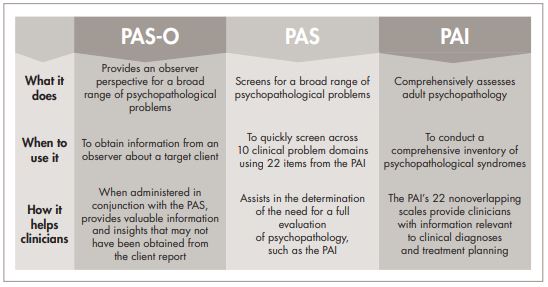Register now and start:
- Accessing PAR Training
- Shopping PAR products & tools
- Using online assessments with PARiConnect
The PAS-O is a 22-item informant report designed to obtain information from an observer (such as a spouse, relative, or close friend) about a client. It screens for a broad range of clinical issues and was developed to complement the self-report PAS.
Administration
When the informant has finished answering the questions, the examiner should tear the perforation on the right and left side of the Answer sheet and peel back the top page to reveal the scoring sheet underneath. The scoring sheet provides item scores ranging from 0 to 3 for each of the 22 PAS-O items. It is important to note that the PAS/PAS-O comparison can also be accomplished if the client completed the full PAI (rather than the PAS) because all 22 items from the PAS are embedded in the PAI. Calculate the total score raw difference by subtracting the PAS Total score from the PAS-O Total Score.
The PAS-O is a fast, efficient report to complement the PAS or PAI. It is a 22 item screener that takes 5 minutes to administer and suitable for instances when a client is unable to complete the PAS due to confusion, thought disorder, or other limitations. If PAS or PAS-O results indicate the need for in-depth testing, the PAI provides information relevant for clinical diagnosis and treatment planning.
